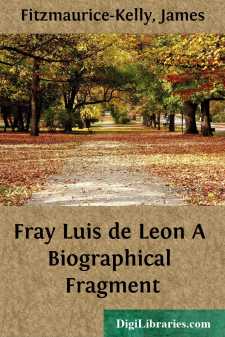Categories
- Antiques & Collectibles 13
- Architecture 36
- Art 48
- Bibles 22
- Biography & Autobiography 813
- Body, Mind & Spirit 142
- Business & Economics 28
- Children's Books 15
- Children's Fiction 12
- Computers 4
- Cooking 94
- Crafts & Hobbies 4
- Drama 346
- Education 46
- Family & Relationships 57
- Fiction 11829
- Games 19
- Gardening 17
- Health & Fitness 34
- History 1377
- House & Home 1
- Humor 147
- Juvenile Fiction 1873
- Juvenile Nonfiction 202
- Language Arts & Disciplines 88
- Law 16
- Literary Collections 686
- Literary Criticism 179
- Mathematics 13
- Medical 41
- Music 40
- Nature 179
- Non-Classifiable 1768
- Performing Arts 7
- Periodicals 1453
- Philosophy 64
- Photography 2
- Poetry 896
- Political Science 203
- Psychology 42
- Reference 154
- Religion 513
- Science 126
- Self-Help 84
- Social Science 81
- Sports & Recreation 34
- Study Aids 3
- Technology & Engineering 59
- Transportation 23
- Travel 463
- True Crime 29
Fray Luis de Leon A Biographical Fragment
Categories:
Description:
Excerpt
I
We are all of us familiar with the process of 'whitewashing' historical characters. We are past being surprised at finding Tiberius portrayed as an austere and melancholy recluse, Henry VIII pictured as a pietistic sentimentalist with a pedantic respect for the letter of the law, and Napoleon depicted as a romantic idealist, seeking to impose the Social Contract on an immature, reluctant Europe. Though the 'whitewashing' method is probably not less paradoxical than the opposite system, it makes a stronger and wider appeal, inasmuch as it implies a more amiable attitude towards life, and is more consonant with a flattering conception of the possibilities of human nature. A prosaic narrative of established facts does not immediately recommend itself to the average man. Possibly few have existed who were so good and so great that they can afford to have the whole truth told about them. At any rate, it is easier to convey a picturesque general impression than to collect all the available evidence with the untiring persistence of a model detective and to present it with the impartial acumen of a competent judge. Moreover, the inertia of pre-existing opinion has to be overcome. Once readers have been accustomed to accept as absolutely authentic an idealized conventional portrait of a man of genius, it is difficult to induce them to abandon it for a more realistic likeness. In the interest of historical truth, however, the attempt must be made. We are sometimes told that 'historical truth can afford to wait'. That may be true; but it has waited for nearly four centuries, and, if it be divulged in English now, the revelation lays us open to no reasonable charge of indiscretion or indecent haste.
It may be that the name of Luis de Leon is comparatively unknown outside the small group of those who are regarded as specialists. Luis de Leon is nothing like so famous as Cervantes, as Lope de Vega, as Tirso de Molina, as Ruiz de Alarcon, and as Calderon, whose names, if not their works, are familiar to the laity. This is one of chance's unjust caprices. With the single exception of Cervantes perhaps no figure in the annals of Spanish literature deserves to be more celebrated than Luis de Leon. He was great in verse, great in prose, great in mysticism, great in intellectual force and moral courage. Many may recall him as the hero of a story—possibly apocryphal—in which he figures as returning to his professorial chair after an absence of over four years (passed in the prison-cells of the Inquisition) and beginning his exordium to his students with the imperturbable remark: 'We were saying yesterday.' Mainly on this uncertain basis is constructed the current legend that Luis de Leon was a bloodless philosopher, incapable of resentment, and, indeed, without a touch of human weakness in his aloof and lofty nature. His works do not lend colour to this presentation of the man, nor do the ascertainable details of his chequered career. The conception of Luis de Leon as a meek spirit, an unresisting victim of malignant persecution, is not the sole view tenable of a complex character. However, the recorded facts may be trusted to speak for themselves.
What was Luis de Leon's full name? Was it Luis Ponce de Leon? So it would appear from the summarized results of P. Mendez printed in the Revista Agustiniana. The point is not without interest, for Ponce de Leon is one of the great historic names of Spain. If Luis de Leon was entitled to use it, he appears not to have exercised his right, for in the report of his first trial he consistently employs some such simple formula as:—'El maestro fray Luis de Leon... digo'. The omission of the name 'Ponce' during proceedings extending over more than four years can scarcely be accidental. It may, however, have been due to monastic humility, or to simple prudence: a desire not to provoke opponents who declared that Luis de Leon had Jewish blood in his veins. Whether this assertion, a serious one in sixteenth-century Spain, had any foundation in fact is disputed....


